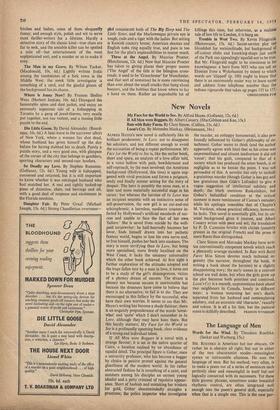New Novels
My Face for the World to Sec. By Alfred Hayes. (Gollancz, 12s. 6d.)
ALFRED HAYES'S new novel is sufficiently like its brilliant predecessor, In Love, not to disappoint his admirers, and just different enough to avoid the accusation of being a repeat performance. My Face for the World to See is, like the earlier book, short and spare, an analysis of a love affair told, in a voice hollow with pain, bewilderment and self-reproach, by the man involved; the American background (Hollywood, this time) is again sug- gested with vivid precision and forms a poignant, seedy and finally sinister setting for the story of despair. The hero is possibly the same man, at a later and more materially successful stage in his career; but whereas the heroine of In Love was an incipient neurotic with an instinctive sense of self-preservation, the new girl is an out-and-out schizophrenic, a harmless, mediocre creature in- fected by Hollywood's artificial standards of suc- cess and unable to face the fact of her own `failure.' She is saved from suicide by the well- paid scriptwriter; he half-heartedly becomes her lover, finds himself drawn into her pathetic fantasy world, begins to lose his own nerve and, to free himself, pushes her back into madness. The story is more terrifying than In Love, but being more specialised, more firmly localised on the West Coast, it lacks the uncanny universality which the other book achieved. At first sight a further exploration of the attitudes adopted and the traps fallen into by a man in love, it turns out to be a study of the girl's disintegration, victim of a phoney dream of success. The dream is phoney not because success is unattainable but because the dreamers have come to believe that there is no alternative; to fail is to die. They are encouraged in this fallacy by the successful, who have their own worries. It seems to me that Mr. Hayes's writing has become a shade flabbier; there is an ungainly preponderance of the words 'some- what' and 'quite' which I don't remember in In Love, although they may have been there. But this hardly matters; My Face for the World to See is a profoundly upsetting book, clear evidence of a strong and individual talent.
If All Men were Beggars is a novel with a strange flavour; it is set in the native quarter of Cairo, a location realised by an abundance of squalid detail. The principal figure is Gohar, once a university professor, who has become a beggar by choice in passive protest against the general ghastliness of the modern world. In his rather abstracted fashion he is something of a saint, and numbers among his disciples an earnest young idealist and a petty criminal of repulsive appear- ance. Short of hashish and mistaking her trinkets for gold, Gohar absentmindedly strangles a prostitute; the police inspector who investigates
the murder, an unhappy homosexual, is also pro- foundly influenced by Gohar's philosophy of de- tachment. Gohar seems to think (and the author apparently agrees with him) that as his crime was unpremeditated and almost inadvertent it did not `count', that his guilt, compared to that of a society which has produced the atom bomb, is so negligible as to be beside the point. I was not persuaded of this. A novelist has only to include a gratuitous murder (though Gohar is less gay and less gratuitous than Gide's Lafcadio) to give a vague suggestion of intellectual subtlety and depth; the blurb mentions Raskolnikov, but Gohar's befuddled condition at the critical moment is more reminiscent of Camus's outsider, while his apologia resembles that of Chaplin's M. Verdoux, whose practical efficiency, however, he lacks. This novel is essentially glib, but its un- usual background gives it interest, and Albert Cossery writes with pace and wit; the translation by P. D. Cummins bristles with clichés (possibly present in the original French) and the prose is more fluent than distinguished.
Clare Simon and Mercedes Mackay have writ- ten conventionally competent novels which reach a pleasantly average standard. In Bats with Baby Faces Miss Simon devotes much technical in- genuity (the narrator, throughout the book, is writing a book about the heroine) to a slightly disappointing story; the early scenes in a convent school are well done, but when the girls grow up the plot becomes both pointless and contrived. Loon's Cry is a smooth, unpretentious book about two neighbours in Canada, lonely in different ways : a woman mourning her son's death, separated from her husband and contemplating adultery, and an eccentric old 'character,' rascally and robust. It is all a bit thin, but the pastoral






























 Previous page
Previous page